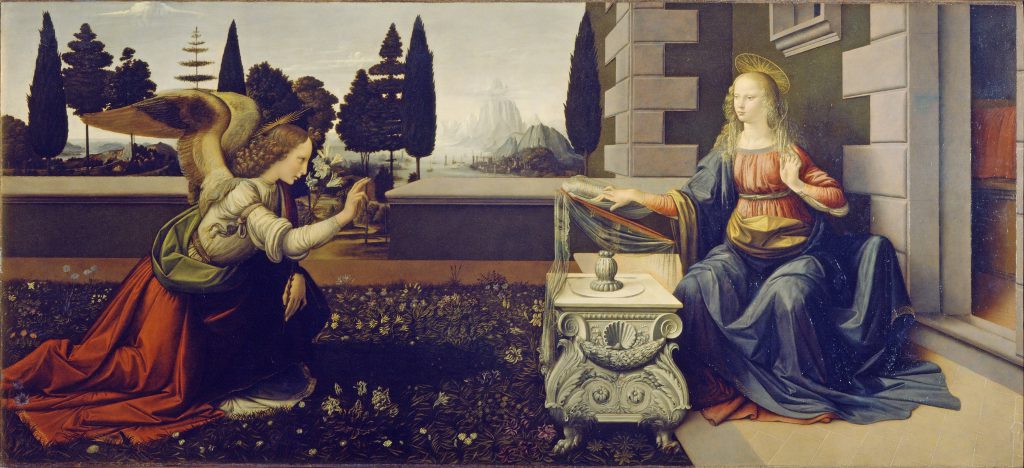We must now consider concerning the first part of this prayer that in ancient times it was no small event when angels appeared to men; and that man should show them reverence was especially praiseworthy. But that an angel should show reverence to a man was never heard of until the angel reverently greeted the Blessed Virgin saying: “Hail.”
“Hail Mary”
In ancient days, an angel would not show reverence to a man, but a man would deeply revere an angel. This is because angels are greater than men, and indeed in three ways. First, they are greater than men in dignity. This is because the angel is of a spiritual nature: “You make your angels spirits” (Ps 103:4). But, on the other hand, man is of a corruptible nature, for Abraham said, “I will speak to my Lord, whereas I am dust and ashes” (Gn 18:27). It was not fitting, therefore, that a spiritual and incorruptible creature should show reverence to one that is corruptible as is a man. Second, an angel is closer to God. The angel, indeed, is of the family of God, and as it were stands ever by Him: “Thousands of thousands ministered to him, and ten thousand times a hundred thousand stood before Him” (Dn 7:10). Man, on the other hand, is rather a stranger and afar off from God because of sin: “I have gone afar off” (Ps 44:8). Therefore, it is fitting that man should reverence an angel who is an intimate and one of the household of the King.
Then, third, the angels far exceed men in the fullness of the splendor of divine grace. For angels participate in the highest degree in the divine light: “Is there any numbering of his soldiers? And upon whom shall not his light arise?” (Jb 25:3). Hence, the angels always appear among men clothed in light, but men on the contrary, although they partake somewhat of the light of grace, nevertheless do so in a much slighter degree and with a certain obscurity. It was, therefore, not fitting that an angel should show reverence to a man until it should come to pass that one would be found in human nature who exceeded the angels in these three points in which we have seen that they excel over men — and this was the Blessed Virgin. To show that she excelled the angels in these, the angel desired to show her reverence, and so he said: “Ave (Hail).”
“Full of Grace”
The Blessed Virgin was superior to any of the angels in the fullness of grace, and as an indication of this the angel showed reverence to her by saying: “Full of grace.” This is as if he said: “I show you reverence because you dost excel me in the fullness of grace.”
The grace of God is given for two chief purposes — namely, to do good and to avoid evil. The Blessed Virgin, then, received grace in the most perfect degree, because she had avoided every sin more than any other saint after Christ. Thus it is said: “You are fair, my beloved, and there is not a spot in you” (Song 4:7). For we know that to her was granted grace to overcome every kind of sin by Him whom she merited to conceive and bring forth, and He certainly was wholly without sin.
The plenitude of grace in Mary was such that its effects overflow upon all men. It is a great thing in a saint when he has grace to bring about the salvation of many, but it is exceedingly wonderful when grace is of such abundance as to be sufficient for the salvation of all men in the world, and this is true of Christ and of the Blessed Virgin. Thus “a thousand bucklers” — that is, remedies against dangers — “hang therefrom” (Song 4:4). Likewise, in every work of virtue one can have her as one’s helper.
St. Thomas Aquinas (1224-1274) is honored as one the greatest theologians in the history of the Church. He is best known for his mammoth theological treatise, the Summa Theologiae . This short work was Thomas’ reflection on the Ave Maria and was translated by Joseph B. Collins (New York, 1939).

